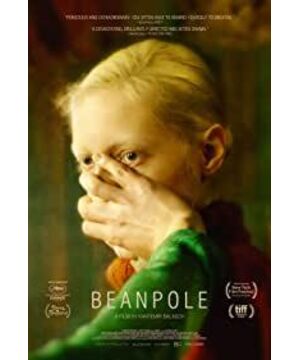This year, the film "Tall" directed by Kontimir Barragov represented Russia in the Oscar for Best International Film (formerly Best Foreign Language Film) competition. Despite this year's strong players, as far as the author is concerned, "Tall" still has great hopes to enter the final short list with its superb directorship and strong visual presentation. The final result remains to be seen.
There are not many works by Balagov, but the starting point is not low. He studied under the famous Russian director Alexander Sokolov ("Russian Ark"). From his works, we can indeed see Sokolov's shadow: Heavy themes, extremely stylized colors, rebellion against mainstream values, attention to the literary and poetic nature of films... His first feature film "Intimacy" (also translated as "narrow") was nominated for Cannes in 2017 The film festival "a kind of attention" unit, and won unanimous praise in French media (French film website AlloCiné media rating 4.1). In fact, "Tall" is only his second feature film, and this film has attracted a lot of attention as soon as it appeared in the shortlist of Cannes "A Concern" unit this year, and it is very important to win this unit in the end. The best director award. From this point of view, Baragov, who is only 28 years old, has indeed gone farther and farther on the road to "pro-son" in Cannes. It is true that some fans call him "Russian Dolan".
Although there are not many works, from the perspective of these two works, Baragov has always expressed the status of women: the women in "Intimacy" were betrayed by their families. In order to redeem the kidnapped son, the parents even intended Marrying a daughter to a wealthy family in exchange for gift money can be seen in the status and living conditions of Russian women; in "Tall", the female body is still a certain kind of exchangeable "goods": we learn from a woman We learned from the officials that not all of the female soldiers who went to the front line during World War II (the heroine Martha was also one of them) went to the battlefield. Some of them were actually comfort women who served as male soldiers in the rear. To a certain extent, the victory of the Soviet Union in World War II was not only based on the sacrifice of the male body, but also based on the ravages of the female body. New interpretation of ". Looking back from contemporary "Intimacy" to the reconstruction period after the end of World War II, Balagov seems to have found a historical continuity and sense of depth for his writing of the fate of Russian women.
However, "Tall" is not entirely a critique of Russia's history and society from the standpoint of disadvantaged women. In fact, the images of women in the film are very three-dimensional and rich. Some women are so autonomous and sober that many men facing them have become truly disadvantaged groups. In one of the most interesting passages in the whole film, Martha comes to the house of her boyfriend Alexander, preparing to meet with his parents and enter into a marriage contract. However, the mother who holds a position in the government completely disagrees with the combination of the two (interestingly, My father has been sitting on the "main seat" for dinner without comment, only to say "close the door" at the end. This is because she knew well about the comfort phenomena that appeared on the front lines during the war, and she was very concerned about Martha. "Death to the country" stayed away, but more importantly, she had great sympathy for Martha (although it was a kind of cold sympathy) because of their shared female identity. She clearly knew that her son had no emotional experience, and she revealed to Martha that Alexander could not take on the responsibilities of her husband and father at all. Until the end, Alexander felt very humiliated, and rushed out of the scene. The vivid and delicate interaction between women can be said to bring the whole movie to a more real and ambiguous situation, and let us feel how complex and contradictory human nature is.
Furthermore, Balagov's brilliance is also that he did not try to portray any character in the film as a mere victim, but to make everyone a link in the entire chain. It can be seen that in the whole story, Martha is certainly a victim of the wartime comfort system, but in turn, she is also violent against her best friend "tall", forcibly asking her and the hospital doctor to give birth to a child for herself. The other party brought huge physical and mental trauma; the "tall" himself seemed innocent, but first inadvertently suffocated Martha's child when his PTSD occurred, and then "freed" a paralyzed person. The soldier, to some extent, became the "accomplice" of the physician. It should be said that what "Tall Guys" shows is a state of mutual harm. The distorted ethical relationship between people represents the mutilation and collapse of the entire Soviet society in the early postwar period, whether it is physical or spiritual. It is still individual and national, which also makes this work more grandiose in layout and far more thought-provoking in concept than the previous one.
No matter from which level, Baragov’s film this year is bolder than ever: the image style is more extreme, the contrast between light and shadow is more obvious, the texture of the oil painting is extremely strong, and the entire film uses extremely bright red and green colors as The main color creates a disturbing and depressing abnormal atmosphere. In a scene, bright green paint flows down the wall, like green blood seeping from the wall. The obscure tortuous narrative once again intensified this sense of anxiety and abnormality. Characters of various colors enter the frame with their own history. Every expression, action, and every short line seem to be light and light, but in fact there is something else. The point is that the whole film gives people a sense of secretiveness (all these characteristics are hard not to remind people of his teacher Sokolov). Balagov also inserted a lot of interesting and thought-provoking details in the film. These details are often compiled into clues, waiting for the audience to assemble, explore and explain by themselves.
For example, there is no clear explanation from the beginning to the end of the scar on Martha's abdomen. If it is really like Martha said to the doctor after she fainted, she was only scratched by shrapnel, why did she stay in a public bathhouse? Silence when asking the tall man inside? Isn't this some kind of proof of honor to defend the country? Reminiscent of later, Martha mentioned in her boyfriend’s home that she had suffered from an abortion again and again, and that she had changed her boyfriend one after another just to survive better, and she was never told that her uterus had been removed, We seem to be able to piece together a new answer. It is true that what we get is only a vague "polysemy", some conjectures that cannot be confirmed and investigated, but the common point of these conjectures is a reality that is more cruel than what Martha said.
It is also based on the "cruel" of the social reality of the post-war Soviet Union that we understand why Martha, who has returned from the battlefield, must work hard to give birth to a child in a tall womb—because the "child" is hope Symbols are extremely important for a mother who has just lost a child or for a country and a nation that is about to rebuild from the ruins. She even did not hesitate to challenge the bottom line of ethics and morality to complete this "fertility" that is both a physiological and a symbolic level, even though this extreme paranoia about the continuation of life has brought a series of tragedies, involving all innocent people. From losing the womb to falling into madness, we can even think of Martha's experience as an ultimate fable that hints at the fate of the Soviet Union after World War II. Balagov seems to be seeking some kind of answer from his audience-hope is good, but is the deformed hope worth pursuing? If World War II is a war that must be won, then where should the kind and beautiful humanity be placed?
This is reminiscent of SA Alexeyevich’s thought-provoking question in "Second-hand Time": "Where do I want to live? A great country or a normal country?" This question It may not be difficult to answer, but for those who have truly experienced victory, it has become a permanent problem.
View more about Beanpole reviews











